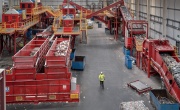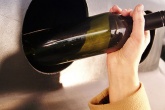MPs call for prospective UK DRS to be ‘all-in’
A cross-party group of 20 MPs called on the prime minister to back an all-in deposit return scheme (DRS) for drinks containers yesterday (13 August), maintaining that a comprehensive system could tackle the UK’s waste problem.
The prospective DRS, set to be introduced across the UK in 2023, would see a small deposit placed on a drinks container at the point of purchase. Once the contents has been consumed, the container can be returned to a collection point and the deposit redeemed, incentivising the customer to return their container for recycling rather than discarding it as litter or general waste.
 20 MPs have signed an Early Day Motion calling for all materials and container sizes to be included in the scheme – plastic and glass bottles, aluminium cans, pouches, cartons and coffee cups.
20 MPs have signed an Early Day Motion calling for all materials and container sizes to be included in the scheme – plastic and glass bottles, aluminium cans, pouches, cartons and coffee cups.
The motion has found support in Liberal Democrat leadership contender Layla Moran, Conservative MP Scot Benton and the Green Party’s Caroline Lucas. Several Labour MPs also joined the calls, including Claudia Webbe, Mohammad Yasin, Rosie Cooper, Mick Whitley, and Grahame Morris.
The move was also backed in Wales by Plaid Cymru MPs Ben Lake and Hywel Williams, and independent Jonathan Edwards, while in Northern Ireland, MPs Colum Eastwood, Jim Shannon and Claire Hanna joined the calls, alongside SNP MPs Chris Stephens and Allan Dorans.
In England, the powers to create a DRS will be provided under the Environment Bill, which is currently in the committee stage, and set to return to Parliament in September.
Scotland has forged ahead with plans for a DRS, announcing that its system, proposed in 2019, would come into force in 2022. This will see a 20 pence cash deposit placed on all drinks containers above 50 milliliters and up to three litres made from all materials.
The responsibility for DRS legislation falls individually on devolved governments, however, England, Wales and Northern Ireland are working closely together to ensure that any system is harmonised across administrations.
Stop the litter
One of the main arguments put forward by proponents of a DRS is its role in reducing litter. Drinks containers are one of the most commonly littered items in the UK, with a 2019 Marine Conservation Society survey recording more than 500 litter items per 100 metres of coastline, with containers of all materials and sizes found on Britain’s beaches.
Dr Laura Foster, Head of Clean Seas at the Marine Conservation Society, said: “No matter if it is a coffee cup, glass bottle or PET bottle, when rubbish gets into our environment it kills our planet.
“Naturally some drinks manufacturers want their containers excluded from the scheme. But this is short-sighted in the extreme.
“Only an all-in system can protect our natural world for generations to come. MPs are right to highlight this.”
According to a Populus poll released last month, the public support the idea of an ‘all-in’ DRS more than ever before, with approval of the policy increasing from 69 per cent to 84 per cent since May of last year.
Calls for a more comprehensive system are also welcomed by campaigners – pointing to the fact that such a system has already operated successfully across Scandinavia for decades.
Surfers Against Sewage Chief Executive Hugo Tagholm said: “In 2017 more than 300,000 people signed our petition demanding a well-designed deposit return scheme to tackle pollution.
“Whitehall has a once-in-a-generation chance to go all out to go all in. The Government cannot afford to mess this up.”
Some sectors have raised concerns over an all-in system, especially glass and aluminium. In 2019, Alupro warned that the Scottish DRS could see the consumers opting for larger plastic bottles as a result of the flat deposit, adding more single-use plastic to the country’s waste stream.
More recently, Dave Dalton, CEO of British Glass, expressed concerns over the inclusion of glass in the UK’s proposed DRS, saying: “British Glass and our member companies fully share the public’s ambition to increase recycling, which is why we’ve set our own 90 per cent recycling target for glass recovery by 2030.
“A DRS is great where existing systems do not exist or function poorly; but when it comes to glass that is not the reality. A DRS will significantly compromise the recovery of jars, splitting glass recycling into two separate systems – which is ultimately detrimental to both.
“We all want to see more recycling, but when it comes to glass, we need to recycle it right. This means improving our current system of household and bottle bank collections to create a truly circular economy and is backed by the whole glass supply chain.”











